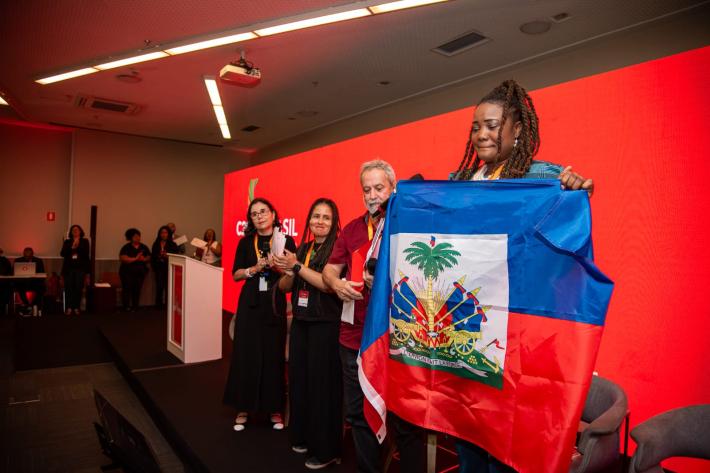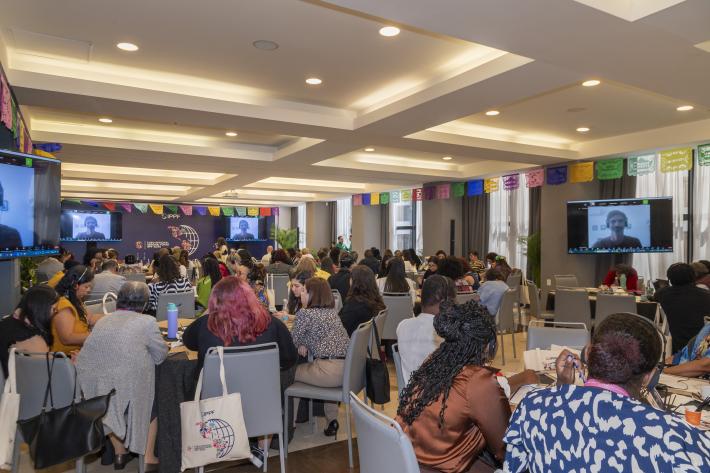Latest press releases
A selection of stories from across the Federation
Americas & the Caribbean
Breaking: IPPF Global Research Exposes Devastating Impact of the Trump Administration
Over Half of Partners and $85 Million Affected
For media enquiries


| 16 October 2023
IPPF ACRO express concern over guidance of the Zambian Ministry of Health who advised against the use of the term “sexual and reproductive health and rights”.
At a time of profound and multiple crises, it is worrying that the focus of any government's action is to go back on already consolidated international commitments, particularly those which recognize, based on evidence, that Sexual and reproductive health and rights (SRHR) are fundamental human rights, central to eradicating poverty and achieving sustainable development across its social, economic, and environmental dimensions. SRHR – which encompasses a range of issues, including universal access to SRH services and supplies, comprehensive sexuality education, and ending gender-based violence and harmful practices such as early, child and forced marriage – are fundamental to the ability of all people, especially women, adolescent girls and young people, to lead full, satisfying, healthy and productive lives. SRH services are a critical aspect of SRHR, but a complete understanding of sexual and reproductive health and rights goes far beyond on access to health facilities and services to include an array of social, legal, institutional, and financial arrangements that enable individuals to exercise their rights in general and addresses the underlying social determinants. In this regard, our Latin American community urges the government of Zambia to review its position and, on the contrary, to improve and expand the SRHR services, including increasing funding in this sector, for example by investing in fulfilling the human rights of women and girls, in all their diversity, as gender discrimination is one of the leading determinants of poor health and unwanted SRHR outcomes. It is also key to addressing inequities in access due to poverty and multiple forms of discrimination, stigma and social and economic exclusion affecting various population groups. We conclude by highlighting the importance of evidence-based policies and, in 2023, the data indicates that effective policies are not those based on stigma and discrimination or elimination of rights. On the contrary, effective policies are those that include, care for, and treat all people as subjects of rights, capable of making decisions about their health and reproductive life, with the support of a State committed to promoting citizenship and the human dignity of their people. Here, at IPPF ACRO, we will remain attentive and always willing to contribute so that rights do not go backwards and no one is left behind. In solidarity, Eugenia Lopez Uribe Regional Director for the Americas and the Caribbean

| 17 March 2022
IPPF ACRO present at the Forum of Latin American and Caribbean Countries on Sustainable Development 2022.
The Fifth Meeting of the Forum of Latin American and Caribbean countries on Sustainable Development 2022 was held in Costa Rica - San José from March 7 to 9, in its face-to-face/virtual form due to COVID-19. This event brought together 1,200 people, including government delegates and representatives of international organizations, the United Nations, the private sector, academia and civil society to discuss the progress and challenges of implementing the 2030 Agenda in the region and how the region has been the most impacted by COVID-19 in terms of development from the health, economic and social point of view. Pamela Martín García, IPPF ACRO's Advocacy and Communications Manager, participated in this indispensable space for regional integration and cooperation. First at the Civil Society meeting and then at the Forum, as well as the March 8th rally in Costa Rica During the event for International Women's Day, civil society representatives expressed their concern about the advance of authoritarian proposals in various governments of the region with public policies that generate setbacks in terms of human rights, sexual and reproductive rights. They also denounced the extreme vulnerability of women environmental defenders in different countries. They called on governments to take affirmative action to address the disproportionate impact of the pandemic on women in the region. One important statistic shared during the event was that 68% of the targets of the Sustainable Development Goals continue on an insufficient trend towards 2030 and that only one third of the 111 targets evaluated are on an adequate pace and trajectory. This urges us to continue working to meet them. The greatest challenge today is to eradicate poverty in all its forms and is an indispensable requirement for sustainable development in the region. During the closing ceremony, delegates from the countries, United Nations agencies, representatives of civil society and other participants paid tribute to Alicia Bárcena, Executive Secretary of ECLAC, who bids farewell to this position with full honors and after a formidable performance, always promoting and defending the human rights of all people. It was she, with her lucidity and eloquence, who for more than 20 years incorporated the feminist perspective in ECLAC and its actions. We join in the heartfelt recognition of a leader who knew how to build in the adversity of inequalities a light of hope throughout the region.

| 25 February 2022
Statement on the escalating conflict in Ukraine
Following the disturbing reports coming out of Ukraine, IPPF has released a media statement on behalf of the Federation and its Member Association in Ukraine. Despite the fact that sexual and reproductive healthcare (SRHR) needs increase significantly during conflict and humanitarian situations, the significant vulnerabilities of affected populations and displaced people are often overlooked, especially the experiences of women, girls and marginalized populations who are at increased risk of unintended pregnancy, sexually transmitted infections and sexual and gender-based violence. IPPF’s Director-General, Dr Alvaro Bermejo, said: "The International Planned Parenthood Federation (IPPF) is deeply concerned about the escalation of conflict in Ukraine. We take our responsibility to preserve the enormous gains made in life-saving sexual and reproductive healthcare across the country very seriously, especially for women, girls and marginalised populations, whose vulnerability and experiences are so often overlooked in humanitarian situations. "For 20 years, IPPF has consistently worked to strengthen and protect the reproductive rights of people in Ukraine, working in the frontline conflict zones of Lugansk and Donetsk since 2014, training medical specialists to provide life-saving reproductive healthcare, psychosocial support and quality care to survivors of sexual and gender-based violence. “Our teams are now contingency planning across the region to address not only the needs of those still in Ukraine, but also the millions who are likely to be displaced by the conflict and who will require critical support to continue accessing healthcare. We will work closely with partners and other NGOs to ensure the least possible disruption to services. "IPPF stands in solidarity with the international community and the brave people of Ukraine who for the last eight years have faced terrifying and difficult circumstances that nobody should ever have to suffer through. We stand by IPPF's frontline team, who, despite the dangers, continue to facilitate life-saving healthcare for those who need it most. We will be monitoring the situation closely to ensure the safety of our colleagues across the region.” For European outlets, please contact [email protected] For UK and other international media outlets, please contact Karmen Ivey on [email protected] or [email protected]
















